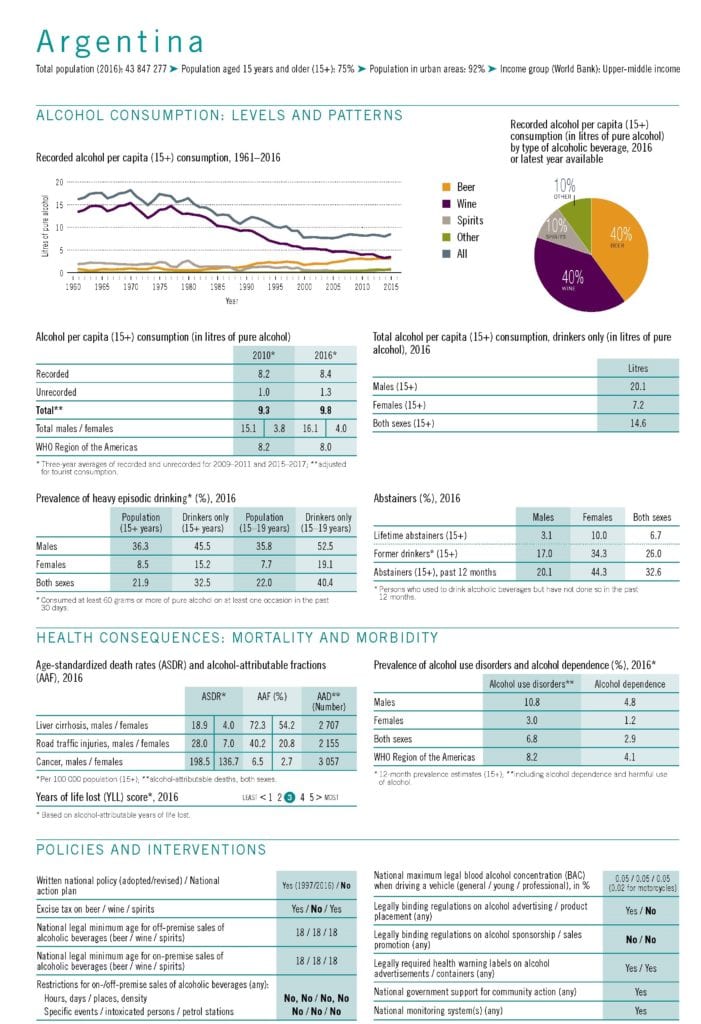Argentina: Growth of Digital Alcohol Retail
Digital alcohol retail is seeing a sales growth in Argentina and with it consumption and alcohol harm is set to increase.
Many existing physical alcohol stores have adopted an online channel and delivery system for alcohol retail. There are websites completely devoted to alcohol retail and delivery as well. Home delivery is making online alcohol retail ever more popular. There are four mechanisms driving the increase in digital alcohol retail.
- Physical stores with an online marketplace,
- Online marketplaces which sell alcohol among other products such as Mercado Libre,
- E-retailers exclusively for alcohol such as Craftsociety, Cheers app, Fullescabio, and
- Home delivery platforms such as Rappi and Glovo.
Online retail and delivery of alcohol means increased availability of alcohol, leading to more consumption in Argentina.
For example, Walmart had a 240% increase in alcohol sales between 2018 and 2019 by using online retail and delivery. Data from Mercado Libre – an operator of online marketplaces – illustrates that on the last Cyber Monday in November 2019, three alcoholic beverages were sold per minute with beer being the highest purchased. In the category for mass consumption, beer had taken the first two places for highest sale.
Delivery apps such as Rappi, Glovo and Orders Ya increase availability even more and add to the problem of increasing alcohol consumption in the country.
Big Alcohol adapting to new trends to gain more profit
This new focus on digital alcohol retail and home delivery is a strategy of Big Alcohol to adapt to changing trends with alcohol and sales patterns in general, in order to maximize their profits. Online sale attracts millennials – who are otherwise increasingly becoming alcohol-free – to consume more alcohol. According to Free Market data, in 2019, 32% of the total users who bought food and alcohol online were between 25 and 34 years old. According to CACE data mobile phones are used in 63% of purchases. With increasign reach to millennials, the risk for minors to be exposed to alcohol is also growing.
Consumption became largely digital, considering that consumers are mostly millennials and centennials who adopt technology quickly and spend more than three hours of their routines on mobile devices, therefore it is strategic for brands to be present on that channel,” said Juan Faggiolini of the Cepas Group, which markets several Big Alcohol brands including Bacardi and Martini, as per La Nacion.
Alcohol harm and policy in Argentina
The government’s view on alcohol clashes with online retail. For example Gabriela Torres, owner of the Sedronar and former coordinator of the National Program for Education and Prevention of Drug Addiction and Misuse of the Ministry of Education, said that alcohol is one of the most consumed and normalized drugs in the country.
As the World Health Organization reports, total alcohol per capita consumption in Argentina is 9.8 litres which has increased slightly from 2010 to 2016 – despite the governments voluntary commitment to reduce alcohol per capita consumption by 10% until 2026. The country has a high consumption comparative to the WHO Americas regional average. Binge alcohol consumption among youth between 15 to 19 years is also rather high, with 40. 4% of youth that consumes alcohol engaging in this harmful behavior. Argentinian men specifically suffer from alcohol harm, with 10.8% having an alcohol use disorder.
Unregulated online alcohol retail is just the latest area where the government needs to do more to protect health and development by better alcohol policies. Other areas where the government can improve alcohol control are also lacking behind. For example wine has no excise tax in the country despite 40% of the consumed alcohol being wine.
There are also no restrictions on alcohol sales and no regulations on alcohol product placement, sponsorship or sales promotions. The Argentinian government needs to address these gaps in line with WHO technical guidance, such as in the SAFER package, and also formulate and enforce laws to regulate digital alcohol retail in order to drive down alcohol consumption and harm within the country.

